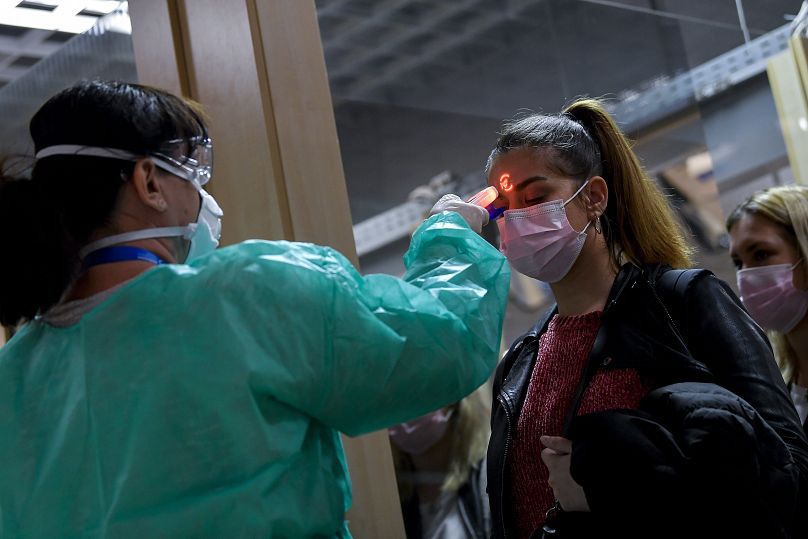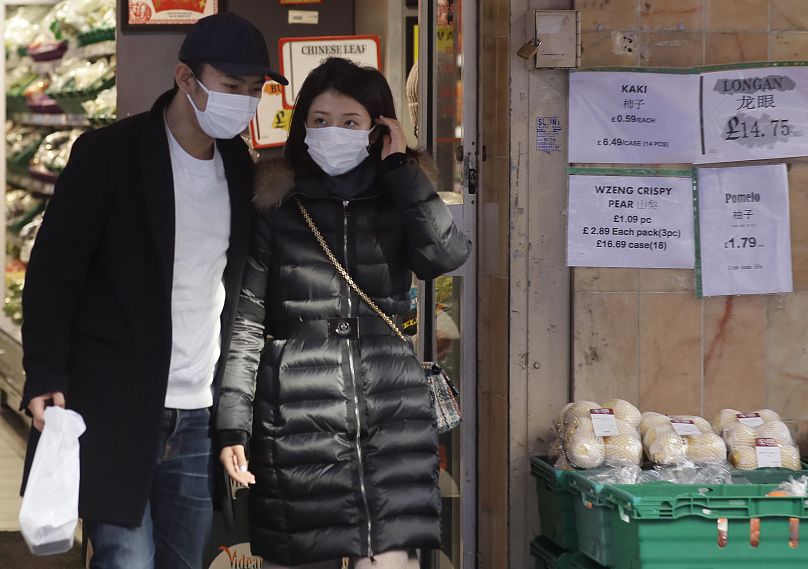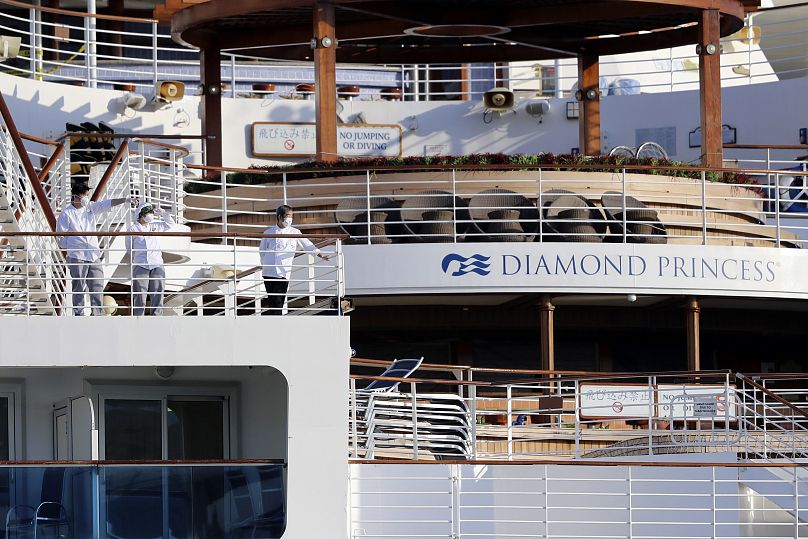There are lots of methods being used by governments and individuals to stem the spread of the coronavirus outbreak - but how many of them are actually effective?
Numerous tactics are being employed by nations and individuals around the world to protect themselves from the spread of the coronavirus, or COVID-19.
 ADVERTISEMENT
ADVERTISEMENT
 ADVERTISEMENT
ADVERTISEMENT
Some methods are personal, such as the purchase of a face mask, while others are deployed on a large scale to detect the SARS-like illness ahead of time.
But which of these preventative measures are the most effective - and are any of them simply unproductive?
Point of entry screenings
Screening for COVID-19 at airports and other points of entry has been widely criticised due to the incubation period of the illness.
It is believed that infected people can be asymptomatic or have very mild symptoms in the first 14 days and yet still be contagious.
By the time more noticeable symptoms have arisen—enough to be picked up by thermal scanners—a person may have passed through several screenings undetected already.
One recent study estimated under "best-case assumptions" that such screening measures would miss around 50% of cases.
Another predicted a slightly better outcome of only 46% of infected travellers entering a country undetected.
Closing borders
The recent outbreak in northern Italy has led to Austria—bordering to the east—considering whether to implement border control.
France, which borders to the west, has said it is not yet considering such controls but has admitted the situation is "worrying".
However, studies into the effectiveness of travel bans and restricting borders have found the method may delay the spread of an illness, but probably won't quash it.
A University of Boston-led study found the lockdown of Wuhan—the epicentre of the COVID-19 outbreak—on January 23 may have been too late as other Chinese cities would have received lots of infected people by this date.
It said: "The travel quarantine delays the overall epidemic progression by only three to five days.
But on the international scale, it added, there would be a "more marked effect" where it is estimated "the number of case importations to be reduced by 80% until the end of February.”
Others have compared it with travel restrictions put in place to quell the spread of influenza—which is believed to be less transmissible than COVID-19—and found “limited effectiveness of this policy”.
According to a piece by scientists at the Yale Institute for Global Health: "International travel bans have to be highly restrictive (i.e. discontinuation of over 90% of air travel) to have any impact.
"Even then, these restrictive measures only slightly delay the spread of the infection and have a very small impact on the magnitude of outbreaks."
Masks
The Centres for Disease Control and Prevention (CDC) recommends people only wear masks if they are exhibiting symptoms of COVID-19 "to help prevent the spread of disease to others", but those who aren't should not.
"If an individual is infected...a face mask would help prevent transmission to others," Jennifer Lighter, a hospital epidemiologist and assistant professor of pediatric infectious diseases at the NYU Grossman School of Medicine told Euronews.
But "there is no reason for the general population to wear face masks," she said.
Others have pointed out the distinction between two types of mask that people are investing in most - the N95 respirators and surgical masks.
Both masks serve different purposes when worn.
For example, the respirator keeps air particles away from the mask wearer, whereas the surgical mask stops germs from the wearer's mouth reaching anyone else.
The N95s are "designed to protect the user" whereas masks "protect the patient," Joseph Kwan, a professor at Hong Kong University of Science and Technology, told AFP.
Quarantine
Governments have put into place quarantine and self-isolating procedures for anyone who has been infected or exposed to the virus.
The Yale Institute for Global Health points out that quarantines are effective when a disease is transmissible ahead of symptoms being present - which is believed to be the case of COVID-19.
But others have pointed out the sensitivity of getting the quarantine right.
Speaking to the National Geographic, Lawrence Gostin, a Georgetown University professor who is also director of the World Health Organisation Collaborating Center on National and Global Health Law, said the recent quarantine aboard the Diamond Princess cruise ship was an "unmitigated disaster".
Thousands of passengers were isolated aboard the ship off the coast of Japan for two weeks after a case of COVID-19 was confirmed.
The number of cases between passengers and crew in the early stages rested at ten people, but a fortnight later had surpassed 600.
"What should have happened is, they [the passengers and crew] should have been disembarked from the boat and placed in isolation or medical quarantines," Gostin said.
Cancelling events
A number of huge events around the world, including the Mobile World Congress in Barcelona, a Six Nations match between Italy and Ireland, and other major sporting meets, have been affected after organisers cited concerns over COVID-19.
The World Health Organisation has advised that the cancellation of public events should be considered in the case of "widespread community transmission" of the virus being established.
But, some events organisers predict that other factors are involved in such decisions outside of high-impacted areas.
READ MORE:
- Don't 'panic' says EU health chief as cases climb faster than China
- The wild COVID-19 coronavirus conspiracies — and why you should ignore them
- Latest breakdown of deaths and infections worldwide
Event management expert Julius Solaris, who runs an event management blog part of Skift, said there could be factors relating to the number of attendees to any particular event being cut due to travel restrictions or fears of corporate liability if a company sends a representative to an event only to get sick.
Speaking specifically about the Mobile World Congress, he said: "We all can safely assume that Asia is a hot market for mobile phones.
"Not having attendees from the countries under COVID-19 watch is a big drawback for those investing money in the event."
He added: "This is the case for many events around the world. I am receiving many, many off the record messages from planners that are cancelling their events both internal and external because Asian colleagues cannot attend."
Other preventative methods (from the World Health Organisation:
Social distancing - building specialist hospitals, quarantines
Close monitoring of effectiveness of health strategies
Giving populations the tools to identify symptoms and reduce risk of transmission
Intensive source control - isolating patients, contact tracing, health monitoring, strict health facility infection prevention and control, continued active surveillance and containment activities
Preparations for resilience in various countries
Preventative methods with personal hygiene (from Public Health England)
- Wash hands often with soap and water, especially after using public transport. Use a sanitiser gel if soap and water are not available.
- Avoid touching your eyes, nose and mouth with unwashed hands.
- Avoid close contact with people who are unwell.
- Always carry tissues with you and use them to catch your cough or sneeze, then bin the tissue and wash your hands (or use a sanitiser gel).













